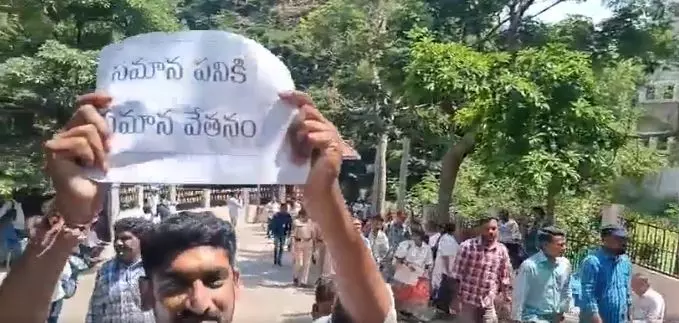Aarogyamitras on Indefinite Strike, Demand Better Pay

Hyderabad:Arogyamithras on Wednesday launched an indefinite strike outside the Arogyasri Healthcare Trust Office in Jubilee Hills demanding better working condition and a raise in their pay scale.
Union leaders met the health minister at his residence later in the evening to discuss these issues.
"There are about 850 Aarogyamitras in the state. We are paid at Grade 4 pay scale which works out to Rs 13,500 per month. As the sole earner of a family of six, it’s simply not enough. Half of my salary goes toward rent, and then there are travel expenses," said Samir Baba from CHC, Nagarkurnool.
"Our workload has increased in recent years, particularly with the introduction of digital patient health cards, announced recently by the government. Although this isn’t part of our official responsibilities, we’re forced to handle it, using our personal mobile phones and internet. We work in two shifts — 9 am to 6 pm and 6 pm to 8 am. But we’re often called in at any time if patients need help," he added.
In larger hospitals like Nims, MNJ, Gandhi and Osmania, the daily patient count exceeds 2,000 while smaller hospitals see about 150 patients a day. "Around 80 per cent of these patients require Aarogyasri services," said Gowardhan from MNJ Cancer Hospital, Hyderabad.
Despite being the primary point of contact for patients at hospitals, Aarogyamitras say they aren’t recognised as skilled workers. "We’re the ones whom patients meet when they enter the hospital. We assist them throughout their treatment and stay, helping them with paperwork and
formalities," said Baby Rani from Samraksha Hospital in Warangal.
Aarogyamitras are responsible for screening patients for pre-authorisation and submitting their documents for final approval to the Arogyasri Trust. A panel of doctors then reviews the case to confirm whether the treatment is covered under the Arogyasri scheme. If any issues arise, the Aarogyamitras rectify them, and the process typically takes 24 hours unless it’s an emergency, in which case treatment begins immediately with a pre-authorisation.
Beyond Aarogyasri and Ayushman Bharat (both were merged in 2021), Aarogyamitras handle various government health insurance schemes, including
ESI, CGHS, and the Journalists Health Insurance Scheme.
"My commute is about 10 kilometers every day, and between rent and travel expenses, there’s barely enough left for basic necessities. Even after completing our shifts, we have to stay on call 24/7. We often don’t have time to have lunch. Despite being labelled as skilled workers on our certificates, our pay doesn’t reflect that," Rani added.
Additionally, Covid-era attendance system requiring us to send selfies from the hospital or with patients as proof of our presence still remains in place. "Now, with the GPRS camera app, it’s even more difficult, as it tracks your location along with the photo. Any technical glitch can wrongly mark us absent," Samir explained. The same system is used for survey work assigned to Arogyamithras.
Like ASHA workers and ANMs, Arogyamithras are subject to a target-based incentive system, with bonuses awarded based on the number of targets met.

